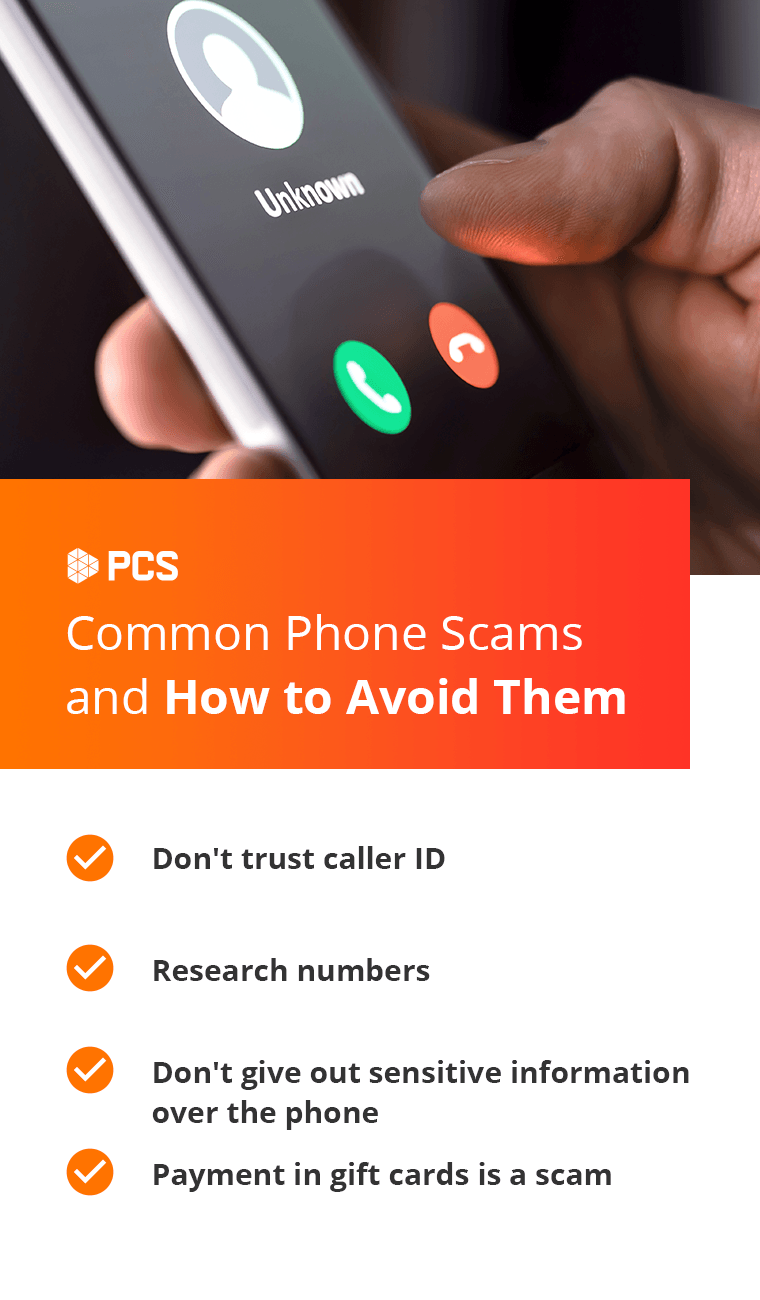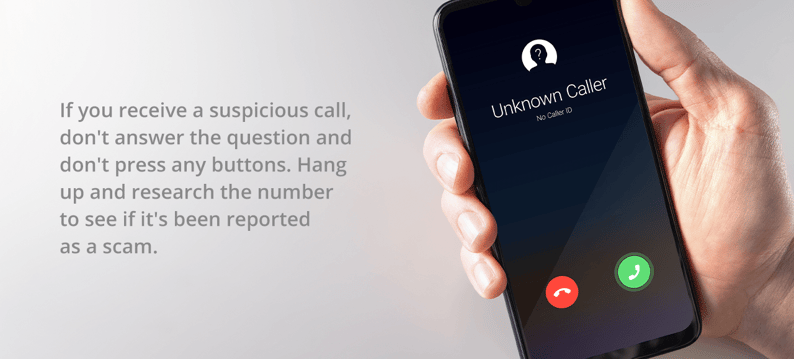However, if you were to follow through and pay the caller, you’d find yourself the victim of a phone scam. Phone scams are fraudulent calls meant to trick their victims into giving up money, personal information or both. Scammers will try to pressure their victims into making rash decisions, either by threatening legal action, offering short-lived deals or otherwise creating a sense of urgency.
Phone scams are a popular method of attack for fraudsters — in 2020, the Federal Trade Commission (FTC) received 1.25 million fraud cases with identifiable methods of contact, and nearly one out of three of those cases cited a phone as the method. In the same year, successful phone scams resulted in a median loss of about $1,170. The silver lining of these statistics is that phone scams are now common enough to be recognized and avoided, as long as you know what to look out for.

Common Phone Scams and How to Avoid Them
You may think that you wouldn’t fall for a phone scam, but don’t be too hasty. Over the years, scammers have invented many different types of scams in order to swindle people out of their money and information. What type of scam they use usually depends on the target. For example, scammers could pretend to be the relative of an elderly victim or a bank associate contacting a college student about loan payments.
Regardless of how you’re targeted, recognizing popular scams can help you to keep your money and information safe. There are also a few basic safeguards that can apply to all scams:
- Don’t trust caller ID: You may think that by avoiding unknown phone numbers, you can avoid scam calls altogether. However, not only can this cause you to miss legitimate phone calls, a recognized number doesn’t necessarily mean it isn’t a scam. Anyone with sufficient knowledge and means can fake a caller ID, and scammers will use this to look more official. In general, most of these official numbers won’t contact you first about the issues the scammers claim you’re having.
- Research numbers: If you have suspicions about the number calling you, do a quick search to see if the number has been marked as unsafe.
- Don’t give out sensitive information over the phone: Unless you’re 100% certain that the number is trustworthy, never give out private information such as bank account numbers, credit card numbers, or your social security number over the phone. If the voice on the other end claims they already know the information and just need you to confirm it, odds are it’s a scam.
- Payment in gift cards is a scam: Even when impersonating professions, scammers will often ask to receive their payment in prepaid gift cards. This is because gift cards are untraceable whereas credit card numbers and banking transactions can be tracked. If the caller says you owe a fee but asks to be paid in gift cards, it’s a scam.
If you keep these tips in mind, you’ll have an easier time recognizing scams when you encounter them. To make it even easier, here are some of the more popular scams from recent years, as well as what you can do to recognize and avoid them.
IRS Calls
As mentioned earlier, the IRS call scam involves the scammer pretending to be a member of the IRS. Some scammers will even be able to provide a badge number or the last four digits of your social security number as proof of their authenticity. They’ll inform the victim that they owe money to the IRS then threaten them with legal action before demanding payment.
These calls are most likely to occur in the summer once tax season has passed as many victims will have completed their taxes but won’t have heard back from the IRS yet. The threat of being sued by the IRS is enough to scare most people into action, but it’s important not to be too hasty.
If you’ve received one of these calls, there are two important things to remember — the IRS will almost always contact you by mail first if you do owe them a debt, and they will never ask for direct payment over calls. If a claimed IRS agent tells you to pay over the phone, particularly if they ask you to pay in gift cards, then it’s a scam.

Tech Support
In this scam, a scammer will call and pretend to be tech support usually from a large corporation such as Microsoft or Apple. From here, they can take several approaches — they may offer you a refund on a product you recently purchased and ask for your financial information in order to process it, or they may ask if your computer’s been running slowly and then sell you “RAM cleaning software” in order to fix it.
However, the most popular variety of this scam involves the scammer claiming that they discovered a virus on your device. They’ll walk you through a series of steps to download the software that will “fix” the issue — in actuality, malware that will give them remote access to your device.
Once they have access, they’ll be able to control, lock, or even remotely erase your device, all of which are even more serious if the computer contains work files or other important information. The scammers will likely ask for payment in exchange for restoring your device, but there’s no guarantee that they’ll solve the problem once you pay them.
Similar to the IRS, tech companies will never call you first in regard to these issues. The purpose of tech support is to be there when you call them. So if they’re calling you first, it’s almost definitely a scam. You should also remember that an official caller ID and use of technical language aren’t guarantees that the call is real. Many scammers will take advantage of the technologically un-savvy and use technological terms to sound more knowledgeable.
Free Cruise/Vacation
If an offer sounds too good to be true, then there’s a good chance that it is. Scammers will sometimes call potential victims and tell them that they’ve won a free cruise, a free vacation, a sweepstakes, a lottery, or some other prize. They’ll then ask for your credit card information in order to charge you a small “processing fee” or for your bank account information in order to wire you the money.
In these cases, recognizing the scam is relatively simple. If you don’t remember entering the contest the scammer claims you won, then you’re being scammed. Even if you did enter a contest at some point, don’t give out your credit card info, bank account info or any other sensitive information over the phone, especially if you don’t recognize the number.
Debt Collectors
It’s an unfortunate truth that many people are in some form of debt. Many scammers will prey on this fact by claiming to be debt consolidators or fee collectors. They’ll either ask for you to pay them over the phone or offer you consolidation loans.
As always, be cautious giving out financial information over the phone. If you suspect that the person calling you is a scammer, ask for their name and company information and say you’ll call them back. If you’ve struggled with loans in the past and sent written letter to agencies asking them not to call you, they’re legally required to abide by your wishes, so you can be confident any calls past that point are scams as well.
Bank Calls
In these scams, the scammer will call and pretend to be an employee from the victim’s bank. They’ll claim that potentially fraudulent activity was detected in the victim’s bank account, then ask for information such as account numbers and passwords.
In these cases, even if you’re worried that the call might be real, the safest thing to do is hang up without disclosing your information. Then, call your bank directly and check to see if they detected any fraudulent activity in your account. Don’t use the number the scammer used or any numbers they provided you — look up the number of your branch and call that instead.
Jury Duty
Scammers will sometimes call their victims and claim that they owe a fine for missing jury duty. These scammers make full use of the ability to fake numbers and caller IDs, appearing as verified law enforcement numbers. The difference is that they’ll ask for your bank account information or for payment via prepaid credit cards which actual law enforcement will not do.
Even if the scammer is threatening arrest if you don’t pay, stay calm. If you have missed jury duty, you’ll almost always be informed via mail or email instead of a phone call. Even if you do get a call, you’ll never be asked to pay over the phone if the issue is legitimate. You also won’t be called outside of normal business hours, so if the call comes in the evening or at night, it’s most likely a scam.
Family Members
This scam is usually directed toward the elderly. The scammer will call and pretend to be a grandson, granddaughter, or other relative and say they need immediate financial support such as bail money. While this seems like an easy scam to avoid, scammers will often have some of the actual relative’s information such as their name, the names of other family members, phone numbers, and addresses. Scammers usually buy or steal this information in advance in order to sound more authentic.
Thankfully, this scam is relatively easy to uncover. If you suspect that the person on the other end isn’t who they say they are, ask them questions only the real family members would know, such as questions about specific family memories. You can also just hang up and call that family member’s phone directly if you believe that person will be able to answer it.
Charities
In the event of a natural disaster or other crisis, some scammers will take advantage of the goodwill of others and pose as collectors for relief charities. They might also claim to be collecting charity funds for local fire departments or police officers.
If you’re unsure of whether the charity is legitimate, ask if you can call them back. If they let you go, do your own research on whether the organization was real. If they panic and try to keep you on the line, then chances are it’s a scam. If the organization is real and you’d like to make a donation, consider making it in ways other than over the phone.
Fake Customers
These scammers directly target small businesses. They call pretending to be customers and say that they have an emergency and need money wired from their account to a secondary location. In these cases, employees should double-check the customer’s identity. They can do this by implementing two-factor verification on major account decisions such as a text or email to their previously provided contacts to confirm the transfer.

“Can You Hear Me?”
This is a particularly insidious method of scamming simply because of how simple it is. The scammer will wait for their victim to answer the phone and ask them an easy question where “yes” is the obvious answer. Once they’ve asked their question, the scammer will record the resulting “yes” and use it to authorize any payments or changes that use voice-authorization software.
While “Can you hear me?” is a popular question choice, the scammer might also ask if the person answering the call is the homeowner or the one in charge of the phone bill. They may also ask the victim to press a number on the dial pad which will confirm to them that the number is active.
If you receive a suspicious call, don’t answer the question and don’t press any buttons. Hang up and research the number to see if it’s been reported as a scam.
How to Report a Scammer
Once you realize you’re on the phone with an attempted scammer, you may be tempted to hang up, block the number, and move on with your day. However, you can take it one step further by reporting the number as fraudulent. In doing so, you can help prevent these scammers from ensnaring more victims in the future.
There are a variety of numbers to call in order to report scams. Depending on the type, you can report it to your local or federal government. If it’s a disaster or emergency scam, you can use the National Center for Disaster Fraud’s online report form. You can also report scams directly to the FTC who accept reports on many types of scams not just phone ones.

Conclusion
Phone scammers have become an increasing issue in the modern world, with perpetrators creating newer and more innovative methods to trick you out of your money and information. They’ll pretend to be family members, business professionals and even law enforcement to try to coerce or threaten you.
While these calls can seem intimidating and often come across that way on purpose in order to pressure you into action, it’s important to stay calm when receiving them. Know what you should and shouldn’t give out over the phone, do your own research, and don’t be afraid to ask questions to make sure the number is legitimate. If you believe you’ve encountered a scam caller, make a report and help make sure it doesn’t happen to someone else.
